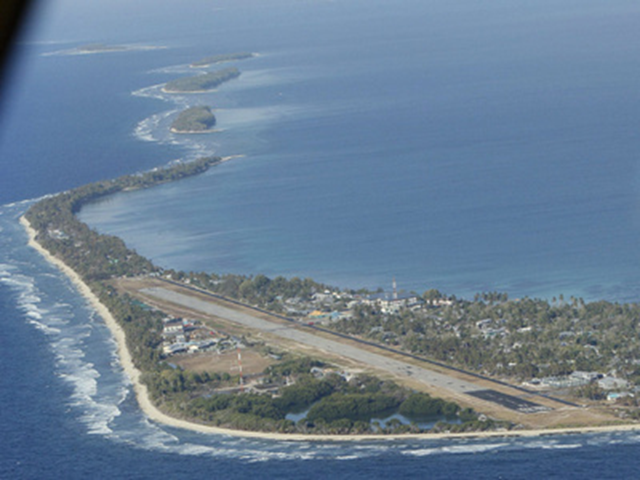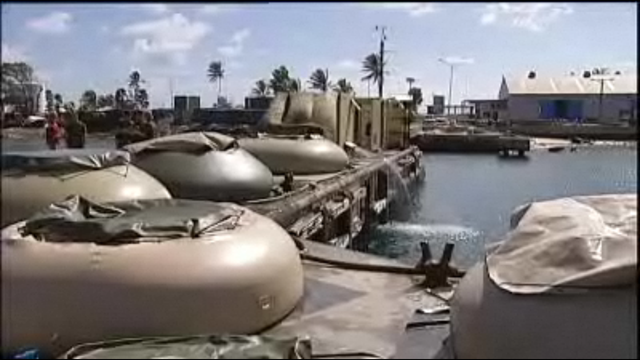South Pacific drought crisis deepens: Tokelau to run dry within days, crops failing on Tuvalu
October 05 (AFP) – A SECOND South Pacific community has called a state of emergency as water rationing continues in parts of the area. Tokelau, a New Zealand-administered territory of about 1400 people, has less than a week’s drinking water after a long drought blamed on a La Niña weather pattern, Foreign Minister Murray McCully said. Mr McCully said Tokelau declared a state of emergency late Monday, following a similar move in neighbouring Tuvalu, which has a population of fewer than 11,000 and where water is already being rationed in places. A New Zealand air force plane landed in Tuvalu on Monday carrying containers of water and desalination units. “There’s been a state of emergency declared in Tokelau as well, where there are three islands, (they are) New Zealand citizens and they’re down to less than a week’s drinking water there too,” he told Radio New Zealand. Tuvalu, one of the world’s smallest independent nations, lies about halfway between Australia and Hawaii. Tokelau is is about 500 kilometres to the east. Mr McCully said other islands in the South Pacific were also reporting water shortages and New Zealand was rushing to assess the situation throughout the region amid fears the crisis could escalate. New Zealand was “making sure we deal with the drinking water issue most urgently,” he said. He said the situation was urgent in parts of Tuvalu. “There’s less than a week’s supply of drinking water on Funafuti, that’s the main island in Tuvalu,” he said. “I understand one of the other outlying islands, Nukulaelae, has a more urgent shortage and there is a desalination plant on the way there. “There are going to be some flow-on effects here, clearly this is having a severe impact on crops, so there’s likely to be a food shortage as well.” […]
By Dominique Schwartz, Tuvalu
15 October 2011
Crops are failing on Tuvalu as the South Pacific nation struggles through a six month drought. A maritime patrol boat was arranged to set off on Friday to assess the situation in eight outlying islands, which the government says are in “bad shape”. Australian Maritime Surveillance Advisor for Tuvalu, Brendan McHarg, said locals relied on their crops as food imports were expensive. “The average Tuvaluan doesn’t earn a lot of money. They are dependent especially on the breadfruit crops. Breadfruit’s one of the major staples,” Navy Lieutenant Commander McHarg said. Emergency desalination units have provided limited water supplies. Preschools have been shut and the hospital is taking only critical patients. The government of the South Pacific nation of Tuvalu says its severe water crisis is likely to continue until at least January. Emergency desalination plants have been set up on two of the nine islands, but water supplies are still limited. The New Zealand, Australian and US defence forces have combined with the Red Cross to set up three temporary units. The island of Nukulaelae was down to its last few buckets of water when help first arrived last week. Disaster Management chairman Pusinelli La’afai says it’s been traumatic.
Crops suffer in Tuvalu drought 
FUNAFUTI, Tuvalu, October 14 (Associated Press) – Palelei Tovia recalls how Tuvalu islanders used to survive droughts with all-night vigils at wells to collect precious fresh water during the moments it seeped into the shafts. Tovia, now a school teacher, said that during the last bad drought 14 years ago, she stayed up beside a well with her high school friends, telling each other stories to stay awake. As the ocean tide rose, she said, it would push fresh water up into the well, and they’d take turns scooping it out, cup by cup. This year’s drought on this isolated atoll in the South Pacific Ocean is equally severe, she said, but with a difference: People no longer turn to well water when the rains don’t come. It’s too contaminated and salty to drink. “The situation is bad,” said Pusinelli Laafai, Tuvalu’s permanent secretary of home affairs. “It’s really bad.” Experts say the contamination is due in part to development and population growth. But part of it, too, can be attributed to greater recent tidal fluctuations, resulting in unusually high tides that have mixed salt water in with ground water. With climate change expected to push sea levels higher in the decades ahead, Tuvalu could become a bellwether for low-lying islands from the Maldives to Kiribati, where rising oceans threaten to contaminate ground water to the point where it becomes unable to sustain life. “Clearly one of the issues for all coral atolls is the limited fresh water available,” said Ian Fry, a climate change lecturer at National University of Australia who also works as an international environmental officer for the Tuvalu government. “It’s one of the greatest problems.” For now, Tuvalu islanders are not focused on this long-term, existential threat. They are preoccupied with the immediate challenge of providing fresh water to their families. […] Forecasters say it could be another three months before the rains return. The situation became so dire that two weeks ago, Tuvalu and neighbouring Tokelau each declared a state of emergency. The Red Cross along with the governments of New Zealand, Australia and the United States averted a catastrophe by rushing in supplies of bottled water and desalination plants. But even this has proved barely enough. […] At the Nauti Primary School, Tovia points to a breadfruit tree just outside her open-air classroom. There are bare branches at the top, falling leaves and no fruit. Usually at this time of year, Tovia said, it’s full of the edible fruit upon which islanders rely.
Then there’s the 22 students in her sixth-grade class. […] Laafai, the Tuvalu home affairs official, is candid in acknowledging that government officials were slow to react to a crisis months in the making.
“I guess people were just here not paying much attention,” he said. “But we did get an occasional splash of rain, and that made people complacent and sit back.”
Laafai said coconut and fruit trees are dying in addition to the breadfruit. And the future, he said, remains uncertain. […] The New Zealand defence force has helped repair Tuvalu’s main desalination unit, which sucks 1,900 litres of saltwater from the lagoon each hour and turns it into fresh water, and has brought over its own large desalination unit to increase capacity. But nobody sees this as a long-term solution. Fry, for one, worries that it’s too expensive. “It’s an energy-using system, and importing fuel is a major drain on the economy,” he said. […] Farmers on the island of Nukulaelae have tried using salty well water to irrigate fields and this has killed some of the crops, said Red Cross technician Greg Johns, who this month helped set up two desalination plants on Nukulaelae.
On Thursday, it rained for a few minutes, the first time in weeks. Ancient tradition says standing in the first rain will bring disease and bad luck, said Tovia, so she avoided getting wet.
“But I put out all my buckets under the roof to get water,” she said.
“It wasn’t even half an inch.”
South Pacific island’s water crisis tipping point for global climate change

